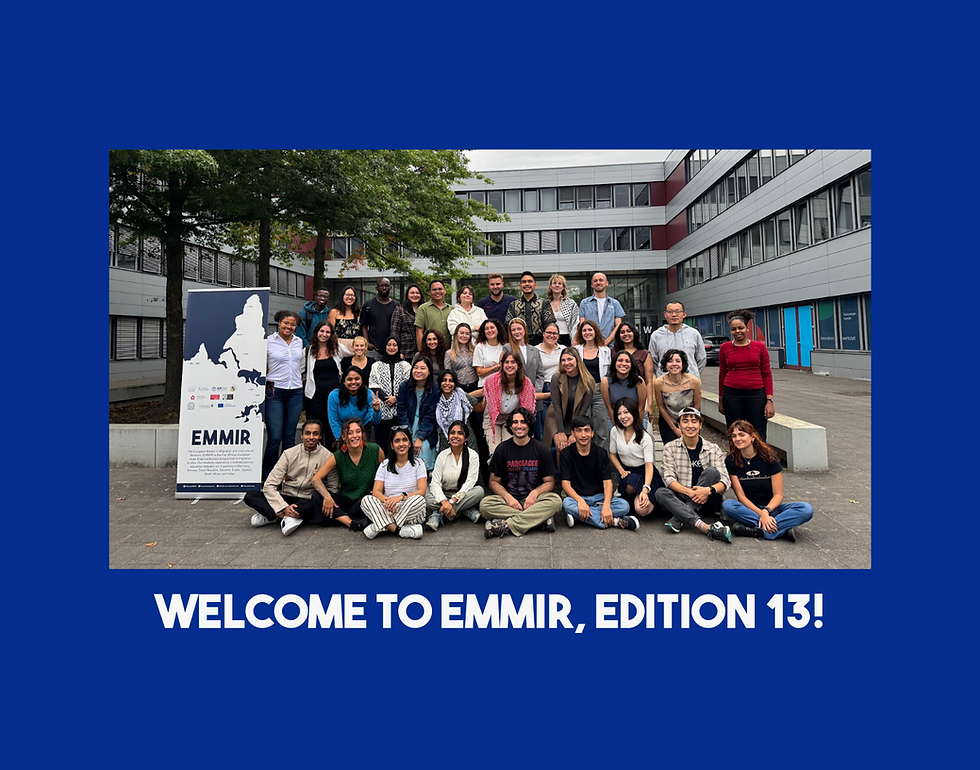Daniel's Internship at IOM Prague
- Nov 21, 2019
- 4 min read
By Daniel Braga Nascimento, EMMIR Cohort 8

After spending my third semester module in South Africa, at the University of Wits, I came to Eastern Europe in order to start my 3-month internship at the International Organization for Migration, in Prague, Czech Republic. My first week – still in August – was very intense. As intern, I was helping the staff with the 11th IOM Summer School. More than 120 students and IOM’s staff from 40 different nationalities came to Prague in order to listen to different topics on the field of migration. With the opportunity I could meet different professionals working on the field of migration and students from the most diverse spectrum who wanted to learn more about migration. One of the highlights moment was the fact my supervisor, Professor Dr. Salim Murat, was one of the lecturers. He also talked to the audience about EMMIR and many people were interested on the program and Erasmus Mundus’s master.

During the second and third week of my internship I got to know the different projects IOM Prague works with: prevention and combating of human trafficking, labour migration, AVR (Assisted Voluntary Return) and reintegration of migrants. The largest population of migrants in Czech Republic are Ukrainians (136,287), Slovaks (76, 649), Vietnamese (58,039), Russian (31, 228) and Polish (20,531) and the countries of destination for Czechs are Germany (545,361), United States of America (74, 639), Slovakia (92,832), Austria (60,561) and United Kingdom (51, 552)[1]. In recent years, the number of foreigners coming to Czech Republic for labour purposes has been steadily increasing. I could see the difficult in finding accommodation due to this “boom” of foreigners. The prices are high, there is a lot of demand and in groups on social medias of expats in Prague it is possible to see different cases of welcoming and not welcoming environment for foreigners. Some advertisement of rooms explicit state: “no foreigners.”
Czech Republic refused to sign the Global Compact for Migration last year and it is not a receiver of refugees in large scales. Currently, there are 2.400 accepted refugees in Czech Republic but racist and xenophobic content were published in different tabloids[2]. In June 2015, 145.000 Czechs signed a petition anti-refugee which was sent to the Czech Parliament. On the other hand, the most prestigious university in Czech Republic, Charles University, offered free study and accommodation for refugees. As it is possible to see, migration is a hot topic in Czech Republic, as in many Eastern European countries. One of the interesting aspects of my internship was that I got to know NGOs and associations which work with migration. One of this projects is FATIGUE, a project coordinated by UCL (University College London) where they monitor the rise of illiberalism and populism in Central and Eastern Europe. Other projects that I had the chance to meet practitioners and their local work were People in Need, a Czech NGO, and the Center of Integration of Prague, an NGO that assists non-Europeans who are staying for more than 90 days in Czech Republic in their process of integration.
As part of the internship we had to write a scientific paper. As one of the topics I was working on at IOM is labour migration, I decided to evaluate whether there is or no xenophobia/racism among Brazilians who live here. As I wanted to evaluate deeply the narratives, I opted for doing semi-structured interviews, which was something I haven’t done before. The idea was to use the time and the supervision I have to gain one more skill: interviewing and afterwards analysing. It was quite interesting to get in touch with nationals from my country working here, since I realize how important is to do interviews in our own language. Probably a lot of the interview would be lost if it was made by someone who does not speak Portuguese. More than that, conducting interviews open many questions that we do not learn from books. How long should be an interview? When should it be over? How to manage the place to meet the respondent and the fact is volunteer so you trust on the kindness of people to leave their homes and take some time to contribute to your research?
The last weeks I helped with the organization of IOM Global Migration Film Festival. All over the world, screening of movies related to migration will take place in November and December of this year. As a way to tell the narratives of people on the move, IOM prepared a selection of more than 30 movies. The trailers of this year catalogue and cities are available here.
Some images from Daniel's time with IOM Prague: film screening from the IOM Migration Film Festival with students from Charles University and attending the Forum 2000.
It has been a journey with no regrets. Reflecting on my experience as an intern at United Nations agency for Migration, I can say that not only has it gave me valuable baggage for my professional career, but it also was a cherished moment where I met people from all over Eastern Europe. I had the chance to attend many conferences and had a great support from IOM Prague team, asking questions and understanding the context which the country is. It was three months of and welcoming environment of learning and I feel very pohoda[3] for this experience.
[1] Encyclopedia of Migration, 2019 - https://www.encyclopediaofmigration.org/en/
[3] Pohoda is a Czech word that means a feeling of satisfaction, happiness and contentment. A hard and unique word to translate.









Comments